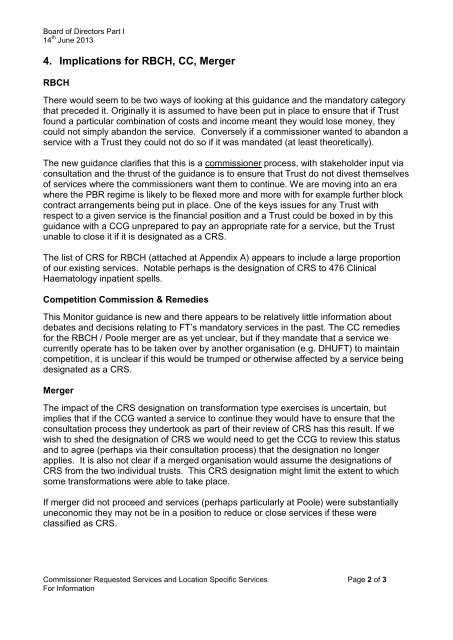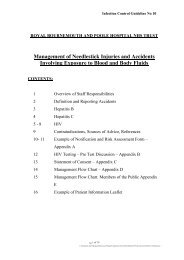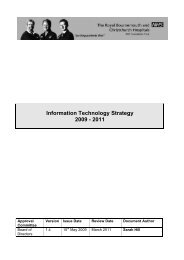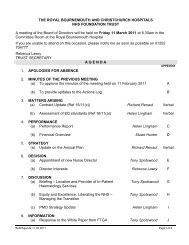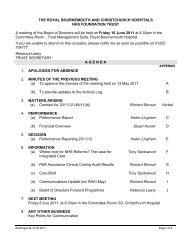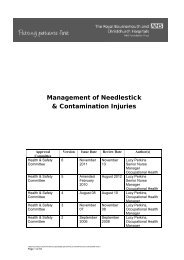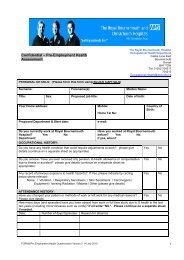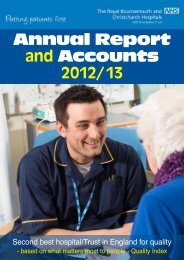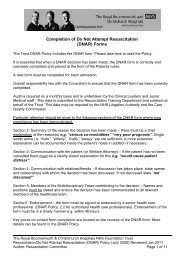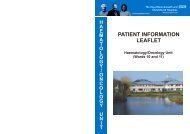A G E N D A 1. APOLOGIES FOR ABSENCE Ian Metcalfe 2 ...
A G E N D A 1. APOLOGIES FOR ABSENCE Ian Metcalfe 2 ...
A G E N D A 1. APOLOGIES FOR ABSENCE Ian Metcalfe 2 ...
You also want an ePaper? Increase the reach of your titles
YUMPU automatically turns print PDFs into web optimized ePapers that Google loves.
Board of Directors Part I14 th June 20134. Implications for RBCH, CC, MergerRBCHThere would seem to be two ways of looking at this guidance and the mandatory categorythat preceded it. Originally it is assumed to have been put in place to ensure that if Trustfound a particular combination of costs and income meant they would lose money, theycould not simply abandon the service. Conversely if a commissioner wanted to abandon aservice with a Trust they could not do so if it was mandated (at least theoretically).The new guidance clarifies that this is a commissioner process, with stakeholder input viaconsultation and the thrust of the guidance is to ensure that Trust do not divest themselvesof services where the commissioners want them to continue. We are moving into an erawhere the PBR regime is likely to be flexed more and more with for example further blockcontract arrangements being put in place. One of the keys issues for any Trust withrespect to a given service is the financial position and a Trust could be boxed in by thisguidance with a CCG unprepared to pay an appropriate rate for a service, but the Trustunable to close it if it is designated as a CRS.The list of CRS for RBCH (attached at Appendix A) appears to include a large proportionof our existing services. Notable perhaps is the designation of CRS to 476 ClinicalHaematology inpatient spells.Competition Commission & RemediesThis Monitor guidance is new and there appears to be relatively little information aboutdebates and decisions relating to FT’s mandatory services in the past. The CC remediesfor the RBCH / Poole merger are as yet unclear, but if they mandate that a service wecurrently operate has to be taken over by another organisation (e.g. DHUFT) to maintaincompetition, it is unclear if this would be trumped or otherwise affected by a service beingdesignated as a CRS.MergerThe impact of the CRS designation on transformation type exercises is uncertain, butimplies that if the CCG wanted a service to continue they would have to ensure that theconsultation process they undertook as part of their review of CRS has this result. If wewish to shed the designation of CRS we would need to get the CCG to review this statusand to agree (perhaps via their consultation process) that the designation no longerapplies. It is also not clear if a merged organisation would assume the designations ofCRS from the two individual trusts. This CRS designation might limit the extent to whichsome transformations were able to take place.If merger did not proceed and services (perhaps particularly at Poole) were substantiallyuneconomic they may not be in a position to reduce or close services if these wereclassified as CRS.Commissioner Requested Services and Location Specific Services Page 2 of 3For Information


